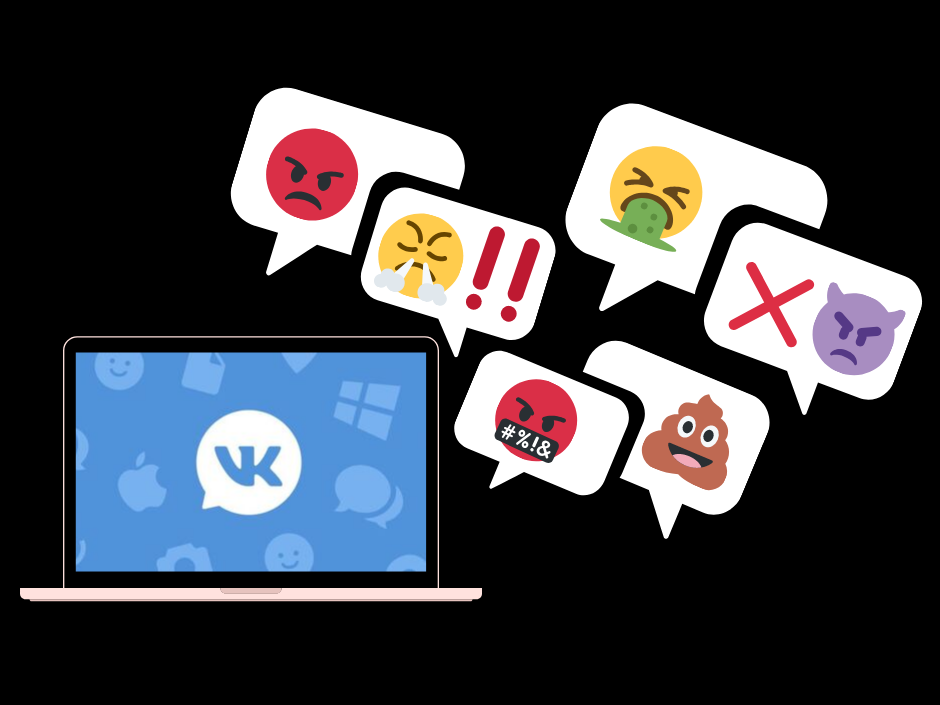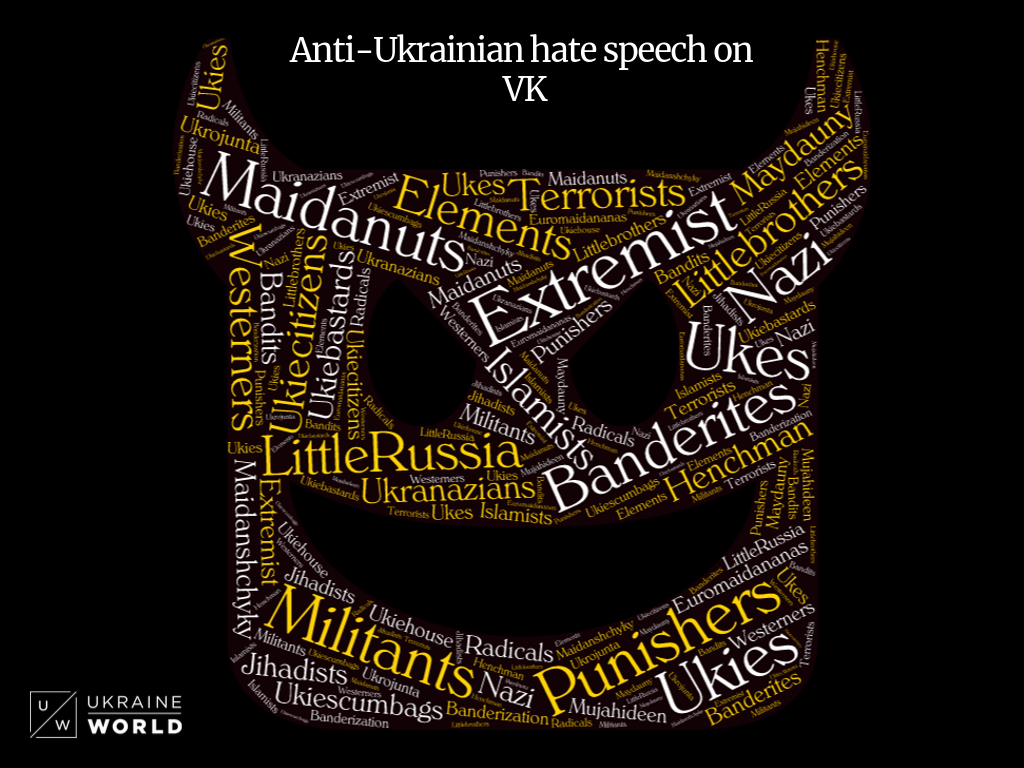
Hate speech became a buzzword in relation to social media: an emotive concept that has no universal definition in international human rights law. In fact, the criteria for identifying hate speech are often ambiguous or inconsistent. Even though this article focuses on examples of words and phrases that can be identified as hate speech defined by European Commission and Ukrainian law, Dr Lidiya Smola, Professor, Researcher in the field of Political/Psychological Sciences explains to UkraineWorld, "hate speech exceeded the limits of verbal communication. Hate became visual: memes, cartoons, drawings. In Russia's war against Ukraine, visual hate speech became a tool of Russian hybrid warfare."
In accordance with the analysis carried out by UkraineWorld and Internews Ukraine, today, VK remains a platform where hate speech is flourishing. VK's terms of use ban content promoting "ethnic, racist, religious, enmity or hostility", popularizing "fascism or supremacist" ideas or the sharing of extremist material. However, VK usually takes no action against content reported by users. My previous article on VK outlines several cases that prove the vague nature of those regulations.
Tackling the question of why VK has a positive climate for hate speech, regulation is the consequence rather than a cause. Lidiya Smola indicates that in Russia hate speech is empowered by high-ranking officials. She adds that Putin himself is the one who contributed to this by saying during Russia's Second Chechen War "we will waste them in the outhouse". Tetyana Matychak, communication expert explains to UkraineWorld, "Russia has a huge state communication machine, which produces, among other things, propagandistic messages that include hate speech. In Ukraine, anti-Russian hate speech is produced mostly by ordinary people."
Some experts, indeed, do consider hate speech against Ukraine to be a tool of Russian hybrid warfare. We selected the most flagrant examples of hate speech connected to Ukraine appearing in VK over the last three years.
Deep hatred and curse words became a mainstay for many anti-Ukrainian users when describing Ukrainians as a nation. In this regard, a poem called "Ukrainians are not Slavs" shows this mindset. It states, "I hate you alive and even dead". This narrative is repeated in different forms of cursing, offences and damnation.
Russian hate speech looks quite "attractive" on VK: users in the main incorporate cursing and offences in poems, songs, use wordplay and allegories. By calling Ukrainians "Ukies" or "Ukes" (short and humiliating for 'Ukrainians', in the original "khokhly" or "ukropy") some Russian users are trying to express their "non-recognition" of Ukrainian ethnicity. Pro-Russian VK users often combine "Ukies" with other offensive words like bastard (khokhlovyrodki), scumbag (khokhlomrazi) and bonzo place (khokhlodurka). In addition, famous Ukrainian greeting or the slogan "Glory to Ukraine, Glory to Heroes!" is often transformed into certain offensive forms like "Glory to salo" ("Slava Salu", where salo is cured pork fat that is popular in Ukrainian cuisine).
On VK, Ukraine is often called "country 404" (strana404). Adding to the Russian narrative of "Ukraine is a failed state" , VK users provide harsh criticism of all reforms. They often draw connections between Ukrainian and Nazi authorities, calling them "Nazis", "Fascists", "Nazi hunta", "punishers" (karateli), "neonats" (neonatsiki) or "douchebags" (podonki). There are many references to Bandera and Shukhevych (Ukrainian nationalist politicians and military leaders of the 20th century). Users mainly call "Banderites" (Banderovtsyi) or "Shukhevych's followers" (posledovateli Shukhevicha) people who support the Ukrainian language, traditions or the Revolution of Dignity. The latter gets most of the attention: there are special VK communities that produce memes and anecdotes about Euromaidan. Users of these communities usually call participants and supporters of Euromaidan mentally retarded. For example, "Maidauny" (combination of words 'Maidan' and 'Down's syndrome sufferer') or "Maidanutyie" (combined with an extremely vulgar word).
There are also words that depend on the connotation. Some pro-Russian users incorporate Ukrainian words in scare quotes while writing Russian in a derogative manner: nezalezhna (literally means 'independent'), nenka (literally means 'mother', a sweet way of calling Ukraine), svidoma (literally means 'conscious').

Crimean Tatars are mostly called "extremists" or "radicals" without any elaboration. Some users consider all Crimean Tatars that are Muslims "Jihadists" and "Islamists". Pro-Russian VK users also often attack Jews. In fact, even the word "Jew" is sometimes used offensively. Mostly, users describe Jews, usually called "Zhidy" (a pejorative name for Jews in the Russian language), as mean swindlers and two-faced fence sitters.
VK users are often intolerant towards the LGBT+ community. Offence is given to members of LGBT communities usually for their sexual orientation. In VK, anti-LGBT+ messages usually attack Europe as it is mainly associated with "Sodom and Gomorrah". Pro-Russian users in the main describe Europe as "dying", in reference to moral values. This is one of the narratives of "Russkiy mir": "Russia is preserving family values, while Europe promotes adultery, infidelity and sin". Such a "hate" approach is mainly used in the context of Ukraine's Eurointegration vector.
Empowered by anonymity, hate speech is a worldwide issue facing multiple stakeholders. For a country at war, which is what Ukraine is, hate speech should be tackled technically and via regulations and narratives.
"There are several examples when hate speech was transformed: pro-Russian social media users tried to dehumanize Ukraine's defenders of Donetsk Airport by calling them 'cyborgs' (kiborgy), which users of pro-Ukrainian social groups used in a positive connotation -- like unbeatable defenders", said Smola. Matychak gives another example: after Russians started calling Ukrainians "banderovets", the "banderovets" greeting "Glory to Ukraine! - Glory to its Heroes!" was approved as the official greeting of the Ukrainian Army.
One day the war will be over and we have to work on reducing hate. The future of VK in Ukraine is unclear, however there are plenty of Ukrainians still using it. Those users mainly reside on the temporarily occupied territory. In terms of the reintegration of Donbas, it is crucial to understand how to bring regions closer to one another. Even though it is a worldwide issue that is still not being addressed effectively, Ukraine should commit itself to tackling hate speech as a country at war and hopefully, someday, peace.
